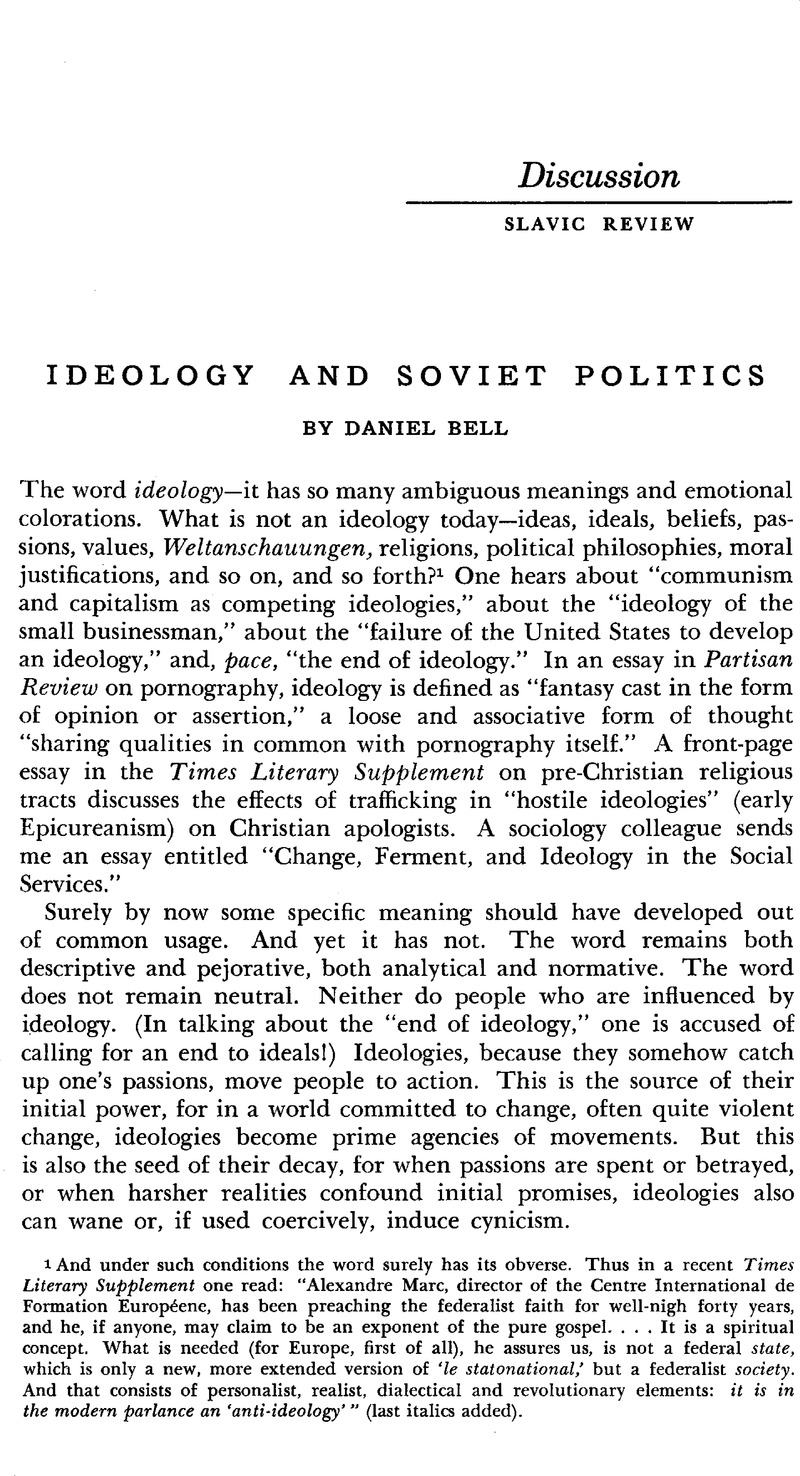Article contents
Ideology and Soviet Politics
Published online by Cambridge University Press: 27 January 2017
Abstract

- Type
- Discussion
- Information
- Copyright
- Copyright © Association for Slavic, East European, and Eurasian Studies. 1965
References
1 And under such conditions the word surely has its obverse. Thus in a recent Times Literary Supplement one read: “Alexandre Marc, director of the Centre International de Formation Europene, has been preaching the federalist faith for well-nigh forty years, and he, if anyone, may claim to be an exponent of the pure gospel… . It is a spiritual concept. What is needed (for Europe, first of all), he assures us, is not a federal state, which is only a new, more extended version of ‘le statonational,’ but a federalist society. And that consists of personalist, realist, dialectical and revolutionary elements: it is in the modern parlance an ‘anti-ideology'” (last italics added).
2 Lenin, V. I., “What Is to Be Done?” in Selected Works, I, Part One (Moscow, 1950), 242 Google Scholar.
3 Ibid., pp. 243-44.
4 Ibid., pp. 245-46.
5 In this and succeeding sections I have drawn freely from a longer paper entitled “Marxism-Leninism: A Doctrine on the Defensive” which was prepared for the 1964 Hoover Institution conference on “A Hundred Years of Revolutionary Internationals.“
6 More formally, then, ideology may be defined as an interpretative system of political ideas embodying and concretizing the more abstract values of a polity (or social movement) which, because of its claim to justification by some transcendent morality (for example, history), demands a legitimacy for its belief system and a commitment to action in the effort to realize those beliefs.
7 For Parsons, in looking at the integrative mechanisms of a social system, values stand at the apex of a hierarchy which includes, in descending order, differentiated norms, collectivities, and roles as the analytical units in the institutionalization of social action. But Parsons begins from the viewpoint of society. If one starts from the problems of politics, one is aware of the need to identify more conscious mechanisms of action. For the analysis of mobilized societies, certainly, one gains considerably by seeing the role of ideology as an intervening mechanism of social control. For an elaboration of Parsons' argument see his essay “Authority, Legitimation, and Political Action,” in Structure and Processes in Modern Society (Glencoe, Illinois, 1960).
8 The phrase is chosen self-consciously as a parallel to the characterization by Parsons of the American value system as one of “instrumental activism,” an attitude to active mastery over nature, a commitment to generalized progress, and a pragmatic attitude toward organization and authority. See Parsons, pp. 172-73.
9 The discussion of parallels, formally in method and substantively in categories, between Soviet philosophy and Catholic scholasticism, while relevant to our problem, is far beyond the scope of this paper. For an outline of these parallels see Gustav, Wetter, Dialectical Materialism: A Historical and Systematic Survey of Philosophy in the Soviet Union (New York, 1958), pp. 555–56 Google Scholar. For a critique see Franz, Borkenau, “A Thomist on Leninism,” The Twentieth Century (London), February 1954 Google Scholar.
10 Soviet Politics—The Dilemma of Power (Cambridge, Mass., 1950), esp. Chap. 7 and 8. For an illuminating discussion of this problem, see also Alex Inkeles, “Social Change in Soviet Russia,” in Berger, Morroe, Abel, Theodore, and Page, Charles, eds., Freedom and Control in Modern Society (New York, 1954)Google Scholar.
11 Alexander, Werth, Russia at War 1941-1945 (New York, 1964), p. 1964 Google Scholar.
12 Daniels, Robert V., “Soviet Thought in the Nineteen-Thirties,” in Indiana Slavic Studies, Vol. I, ed. Ginsburg, Michael and Shaw, Joseph T. (photolithoprinted by Cushing-Malloy, Inc., Ann Arbor, Mich., 1956)Google Scholar.
13 As Talcott Parsons has observed: “In the U.S.S.R. the primary problem concerns the long-run status of the Communist Party—can this quasi-religious structure remain differentiated from the ‘State’ and still maintain a tight control over it? This question involves both the status of religion (in the more analytical sense) and the possibilities of relaxing control in the direction of political democratization. The major problem is closely linked to the latter—it is a question of genuine autonomy, relative to both party and state, of non-political spheres of organization; notably both of the economy, and of the professions and the services in which they are involved. At present, the most acute focus of tendencies to seek this type of autonomy is the ‘intellectuals'—in what sense may science and the arts be treated as the simple handmaidens of the Party?” Talcott Parsons, “Differentiation and Variation in Social Structures,” in Parsons et ah, Theories of Society (New York, 1961), p. 263.
14 For a discussion of the theme of the “end of ideology” as it relates to the Communist world, see the essay by Michael, Polanyi, Beyond Nihilism, the Eddington Memorial Lecture (Cambridge, Eng., 1960)Google Scholar. For a general discussion of the theme, see this writer's The End of Ideology (rev. ed.; New York, 1965), especially the epilogue.
- 6
- Cited by


